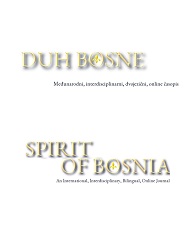Bosnia after Dayton
Bosnia after Dayton
Author(s): Rusmir MahmutćehajićSubject(s): Political history, Politics and religion, Culture and social structure , Social differentiation, Transformation Period (1990 - 2010), Politics of History/Memory, Politics and Identity
Published by: Wittenberg University - Sociology Department
Keywords: Bosnia and Herzegovina; Dayton Peace Agreement; post-Dayton BiH; Bosnian unity; Bosnian social diversity; religion; history;
Summary/Abstract: Bosnia is a name for a model of community life shared by the inheritors of different holy traditions. Its history bears witness to efforts to formalize this model in contemporary modes of thought. In an earlier period––the time of the Bosnian Bans and Kings––this model expressed itself in the effort to justify and establish communal life between different Christian communities. Interpretations of Christ developed differently in the various Christian communities. The disagreements were sometimes large, sometimes hardly noticeable. They took the forms defined as Orthodoxy, Catholicism, and the Bosnian Church. No agreements were formally established to assert that no single creed can have priority, nor that the right road lay in dialogue based on the acceptance of the faiths of all participants. However, it cannot be disputed that the tolerance that these communities showed each other testifies to a respect for the statement that “God gave every people their law and their way of life.” The realization that other teachings might form a meaningful part of this dialogue may have been the reason for a significant number of Bosnian Church leaders to adopt Islam. This suggests that unbiased research into Bosnian history may produce the conditions necessary to reconstruct such a dialogue.
Journal: Duh Bosne
- Issue Year: 16/2021
- Issue No: 4
- Page Range: 1-7
- Page Count: 7
- Language: English

